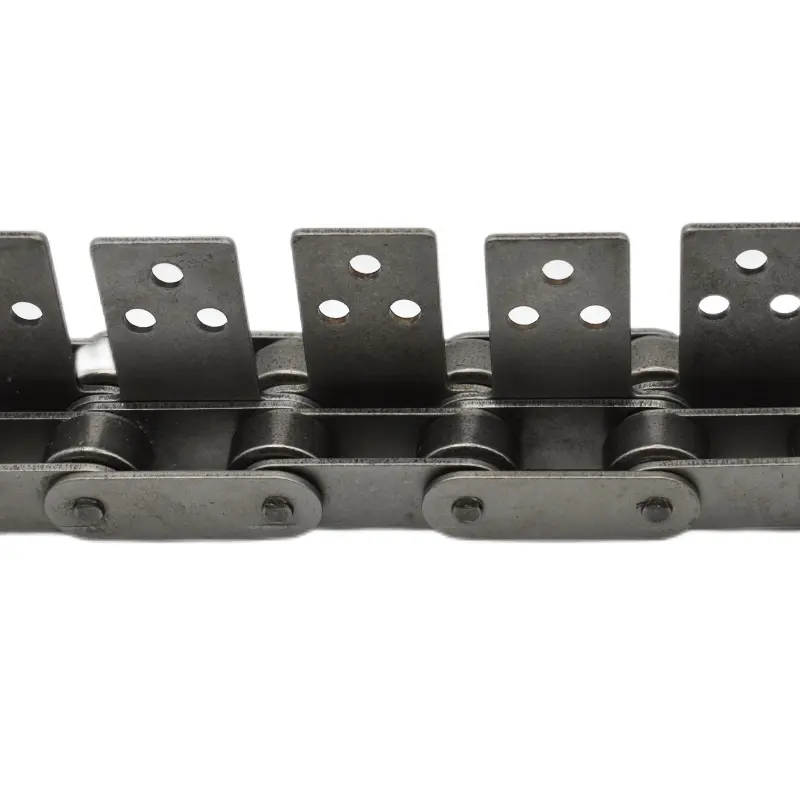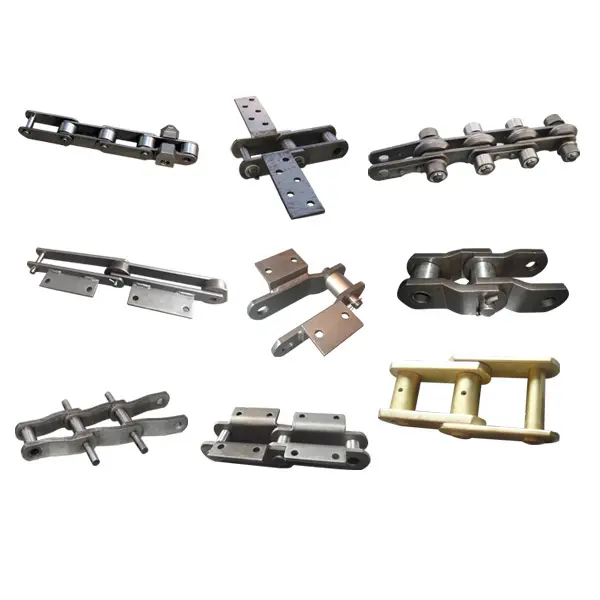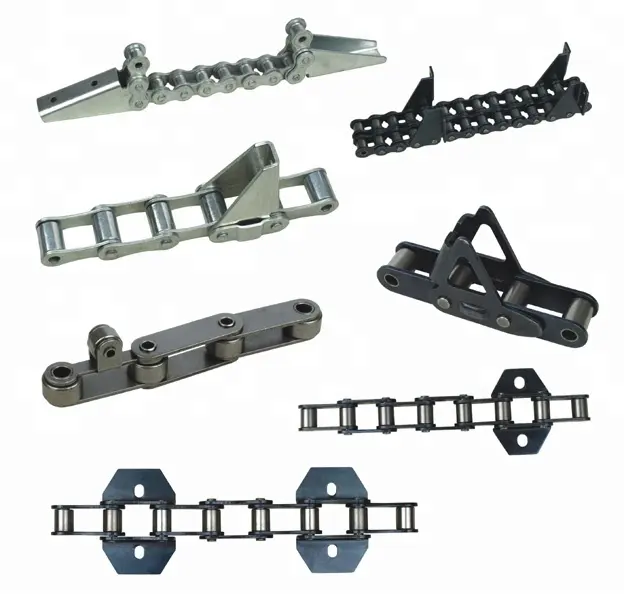Product Description
TRANSMISSION ROLLER CHAIN
Feature
. Long-life duration and high strength
. Good performance of anti-rusty
. Pre-stretching and running for each roll before delivery
. All the chain parts are of complete heat-treatment and controlled within the standarded tolerance
. Can produce any nonstandarded chain according to the drawing or sample
Production Range
1) A Series Short-Pitch Transmission Precision Roller Chain
25-1R, 35-1R, 40-1R, 50-1R , 60-1R, 80-1R, 100-1R, 120-1R, 140-1R, 160-1R, 180-1R, 200-1R, 240-1R
Double stand, triple strand are available
2). B Serieis Short-Pitch Transmission Precision Roller Chain
05B-1R, 06B-1R, 08B-1R, 10B-1R, 12B-1R, 16B-1R, 20B-1R, 24B-1R, 28B-1R, 32B-1R, 40B-1R, 48B-1R
Double stand, triple stand are available.
3). Short-Pitch Heavy Roller Chain
40H, 50H, 60H, 80H, 100H, 120H, 140H, 160H, 200H
4). Motorcycle Chain
25H, 219H, 420, 420H, 428, 428H, 520, 520H, 530, 530SH, 630
OTHER SERIES STEEL CHAIN
1. Conveyor chain: C2040, C2042, C2050, C2052, C2060, C2062, C2060H, C2062H, C2080, C2082, C2080H, C2082H, C2100, C2102, C2100H, C2120H, C2160, C2162, C2160H, C2162H,
2. Hollow Pin Chain: C2040HP, C2050HP, C2042HP, C2052HP, C2060HP, C2062HP, C2080HP, C2082HP, 40HP, 50HP, 60HP, 80HP
3. Agricultural Roller Chain: S32, S42, S45, S52, S55, S62, S77, S88, C550, C620, CA550, CA557, CA620
4. Welded Steel Cranked Link Mill Chain: W78, W82, W110, W111, W124, W132
5. Leaf Chain: BL622, BL623,BL634, BL644, BL646, BL666, BL688, BL822, BL823, BL834, BL844, BL846, BL866, BLF888, BL1571, BL1034, BL1046, BL1066, BL1222, BL1244, BL1288, BL1422, BL1444, BL1488, BL1622, BL1644, BL1688, BL2571, BL2034, BL2066, BL2088
6. Drop Forged Chain: X348, X458, X678, X689
7. Chain Coupling: 4012, 4014, 4016, 5014, 5016, 5018, 6018, 6571, 6571, 8018, 8571, 8571, 10571, 12018
FAQ
Q1. Can I have a sample order?
Yes, any sample order is welcome to know the quality of our products.
Q2. What about the lead time of the sample or the final order?
2-5 days for normal sample.
20-30 days for a formal order.
Q3. How much is the minimum quantity for each item in 1 order?
Any quantity is ok to run.
Q4. Is it possible to print our logo or brand on the belt?
Yes, we can print your logo or design on the belt after receipt of your formal authorization letter of the logo or your brand.
Q5. Do you offer the guarantee for your product?
Yes, usually we offer 1 year warranty for all of our products.
/* January 22, 2571 19:08:37 */!function(){function s(e,r){var a,o={};try{e&&e.split(“,”).forEach(function(e,t){e&&(a=e.match(/(.*?):(.*)$/))&&1
| Standard or Nonstandard: | Standard |
|---|---|
| Application: | Textile Machinery, Conveyer Equipment, Motorcycle, Food Machinery, Mining Equipment, Agricultural Machinery |
| Surface Treatment: | Polishing |
| Structure: | Roller Chain |
| Material: | Carbon Steel |
| Type: | Short Pitch Chain |
| Samples: |
US$ 0/Piece
1 Piece(Min.Order) | |
|---|
| Customization: |
Available
| Customized Request |
|---|

Can agricultural chains be used in forestry and timber harvesting equipment?
Yes, agricultural chains can be used in forestry and timber harvesting equipment for specific applications. While they are primarily designed for agricultural use, their robust construction and ability to handle heavy loads make them suitable for certain tasks in the forestry industry.
In forestry and timber harvesting equipment, agricultural chains are often employed in tasks such as:
- Conveying Logs: Agricultural conveyor chains can be utilized in conveyor systems to transport logs from one location to another within a processing facility or sawmill.
- Debarking: Pintle chains or roller chains may be used in debarking equipment to remove the bark from logs before further processing.
- Material Handling: Agricultural chains with appropriate attachments can be applied in material handling equipment to lift, move, or stack timber and logs.
It’s important to note that while agricultural chains can be used in certain forestry applications, there are specialized chains explicitly designed for the forestry and logging industry, such as forestry chains and chainsaw chains. These specialized chains are tailored to handle the unique challenges posed by cutting and processing timber in the forest.
When considering the use of agricultural chains in forestry equipment, it’s crucial to assess the specific requirements of the task and ensure that the chain’s design and strength are suitable for the intended application. Regular maintenance and inspection should also be carried out to ensure safe and efficient operation.

What are the common challenges faced by agricultural chains in the field?
Agricultural chains encounter several challenges in the field due to the demanding and harsh conditions of farming operations. Some of the common challenges include:
- Abrasion and Wear: Agricultural chains often operate in dusty and abrasive environments. Soil particles, crop residues, and other debris can cause significant wear on the chain’s components, leading to reduced efficiency and potential failure.
- Corrosion: Exposure to moisture, fertilizers, and pesticides can cause corrosion in agricultural chains, especially if they are not adequately protected. Corrosion weakens the chain and shortens its lifespan.
- High Loads and Shock Loads: Farming equipment frequently experiences high loads and shock loads during operations, such as when encountering tough soil or harvesting dense crops. These sudden force variations can put immense stress on the chains, leading to fatigue and breakage.
- Misalignment: Improper alignment of sprockets and other chain components can result in uneven wear and reduced performance. Misalignment is a common issue that can lead to premature failure of the agricultural chain.
- Temperature Extremes: Agricultural chains may be subjected to extreme temperature fluctuations, from hot summer days to freezing winter nights. Such temperature variations can affect the chain’s material properties and lubrication, impacting its performance.
- Contamination: The presence of dirt, debris, or crop residues can contaminate the chain’s lubrication, reducing its effectiveness and increasing friction.
To address these challenges, it is essential to choose high-quality agricultural chains made from durable materials and provide regular maintenance. Proper lubrication, alignment, and protection from environmental factors can significantly extend the lifespan and reliability of agricultural chains in the field.

What are the key features to consider when selecting an agricultural chain?
When selecting an agricultural chain, several key features need to be considered to ensure its optimal performance and longevity in farming equipment. These features include:
- Material: The material of the agricultural chain is crucial as it affects its strength, durability, and resistance to wear and corrosion. Chains are commonly made from carbon steel, stainless steel, or alloy steel, with each offering different properties suited to specific applications.
- Tensile Strength: The tensile strength of the chain determines its load-carrying capacity. It’s essential to choose a chain with adequate tensile strength to handle the maximum loads encountered in the application.
- Pitch Size: The pitch size refers to the distance between the center of one chain pin to the center of the next pin. It’s crucial to select the correct pitch size to ensure compatibility with the sprockets or gears in the agricultural machinery.
- Working Conditions: Consider the operating environment of the agricultural equipment, including temperature, moisture levels, and exposure to dirt and debris. Choosing a chain that can withstand the specific working conditions will enhance its performance and longevity.
- Lubrication Requirements: Some chains may require regular lubrication to reduce friction and wear. Assessing the lubrication needs and the ability to maintain proper lubrication in the application is essential for chain performance.
- Corrosion Resistance: In certain agricultural applications, exposure to moisture or chemicals can lead to corrosion. Choosing a chain with excellent corrosion resistance ensures a longer service life in such environments.
- Load Distribution: Consider how the load will be distributed across the chain and the number of strands required to handle the load efficiently. Improper load distribution can lead to premature wear and failure.
- Installation and Maintenance: Evaluate the ease of installation and maintenance requirements of the chain. Chains that are easy to install and maintain can reduce downtime and enhance productivity.
By carefully considering these key features and matching them to the specific requirements of the agricultural equipment and application, farmers and agricultural workers can select the most suitable agricultural chain for their needs, ensuring reliable and efficient operation.


editor by CX 2024-04-11
by
Tags:
Leave a Reply